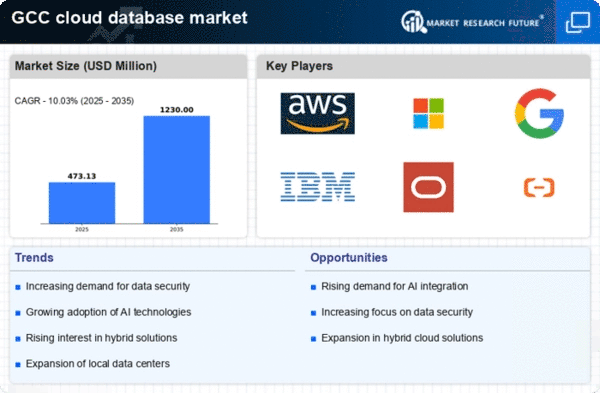Increased Adoption of Cloud Solutions
The cloud database market is experiencing a notable surge in adoption across various sectors in the GCC. Organizations are increasingly recognizing the benefits of cloud solutions, such as scalability, flexibility, and cost-effectiveness. According to recent data, the cloud computing market in the GCC is projected to reach approximately $10 billion by 2025, indicating a robust growth trajectory. This trend is likely to drive the demand for cloud databases, as businesses seek to leverage cloud infrastructure for data storage and management. The shift towards digital transformation is further propelling this adoption, as companies aim to enhance operational efficiency and improve customer experiences. Consequently, the increased adoption of cloud solutions is a significant driver for the cloud database market, as it aligns with the broader trend of businesses moving towards cloud-based technologies.
Cost Efficiency and Operational Agility
Cost efficiency is a pivotal driver for the cloud database market in the GCC. Organizations are increasingly seeking ways to reduce operational costs while maintaining high performance and reliability. Cloud databases offer a pay-as-you-go pricing model, which allows businesses to optimize their IT expenditures. This model is particularly appealing to small and medium-sized enterprises (SMEs) that may lack the resources for extensive on-premises infrastructure. Furthermore, the operational agility provided by cloud databases enables organizations to quickly adapt to changing market conditions and customer demands. As businesses strive for greater efficiency and flexibility, the cloud database market is likely to see continued growth, driven by the desire for cost-effective solutions that enhance operational capabilities.
Growing Data Generation and Storage Needs
The cloud database market is significantly influenced by the exponential growth in data generation in the GCC. With the rise of IoT devices, social media, and digital transactions, organizations are producing vast amounts of data that require efficient storage and management solutions. It is estimated that data generation in the region will increase by over 30% annually, necessitating scalable cloud database solutions. This growing demand for data storage compels businesses to migrate from traditional on-premises databases to cloud-based systems. These systems offer enhanced scalability and accessibility. As organizations strive to harness the value of their data, the cloud database market is poised to benefit from this trend, as it provides the necessary infrastructure to accommodate the increasing data storage needs.
Regulatory Compliance and Data Sovereignty
In the GCC, regulatory compliance and data sovereignty are becoming critical factors influencing the cloud database market. Governments in the region are implementing stringent data protection regulations, which require organizations to ensure that their data is stored and processed in compliance with local laws. This regulatory landscape is driving businesses to adopt cloud database solutions that offer robust compliance features. For instance, the introduction of the UAE Data Protection Law mandates that organizations implement adequate measures to protect personal data. As a result, cloud database providers are enhancing their offerings to meet these compliance requirements, thereby fostering growth in the market. The emphasis on regulatory compliance is likely to shape the cloud database market. Organizations prioritize solutions that align with legal obligations.
Enhanced Collaboration and Remote Work Capabilities
The cloud database market is being propelled by the increasing need for enhanced collaboration and remote work capabilities in the GCC. As organizations embrace hybrid work models, the demand for cloud-based solutions that facilitate seamless collaboration among teams is rising. Cloud databases enable real-time access to data from any location, fostering improved teamwork and productivity. This trend is particularly relevant in sectors such as education and healthcare, where remote access to data is crucial. The ability to collaborate effectively while ensuring data security is driving organizations to adopt cloud database solutions. Consequently, the emphasis on collaboration and remote work capabilities is a significant driver for the cloud database market, as businesses seek to leverage technology to support their evolving work environments.
















